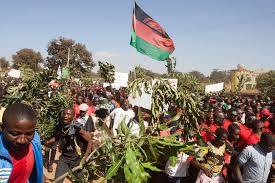Human Rights Watch (HRW) has raised serious concerns over Malawi’s preparedness to hold free and fair general elections in September 2025, following a violent attack on peaceful demonstrators by a group of armed men on June 26. The organization said that the failure of police to intervene or make any arrests suggests possible complicity or political bias in favour of the ruling Malawi Congress Party (MCP), which has been accused of using intimidation to silence dissent.
The demonstrators were part of a peaceful protest organized in Lilongwe by Citizens for Credible Elections, a local civil society group advocating for electoral reforms. They demanded an independent audit of the voters’ roll and the resignation of key officials from the Malawi Electoral Commission (MEC), alleging that the current roll is flawed and vulnerable to manipulation.
However, the protest turned violent when 10 to 20 masked men, reportedly armed with sticks, sjamboks (heavy leather whips), and large knives, descended on the crowd. They beat protesters, destroyed property, and attempted to abduct Sylvester Namiwa, the head of the Center for Democracy and Economic Development Initiatives (CDEDI) and chief organizer of the event.
According to Namiwa, the assailants attacked him in full view of police officers, who stood by and did nothing. He said they dragged him toward a Toyota SUV and attempted to force him into the vehicle, an act he believes was meant to abduct or possibly torture him. He escaped only after police belatedly fired tear gas. He was later treated for injuries in a local hospital. The attackers also looted the group’s public address system, damaged vehicles, and set two cars ablaze.
A female member of Citizens for Credible Elections reported that she was also beaten by the attackers while pleading for help from nearby police officers, who ignored her cries. She sustained a cut on her hand and injuries to her back. Journalists and local human rights monitors who were present confirmed that police made no attempt to stop the violence or protect the demonstrators. To date, no arrests have been made.
This is not the first time similar violence has occurred. In November 2024, civil society groups and opposition parties accused the MCP of orchestrating another attack on demonstrators calling for electoral reforms. In that instance too, masked assailants used weapons against peaceful protesters, while law enforcement officers allegedly looked on passively.
The latest incident has prompted local and international outcry. HRW’s senior Africa researcher, Idriss Ali Nassah, stated, “Malawian authorities need to investigate this brutal attack on peaceful demonstrators and ensure that those responsible are appropriately punished. For Malawians to have confidence in the fairness of the upcoming election, they need to be sure the police will respond promptly and impartially to threats or acts of violence, no matter who is responsible.”
The Malawi government, bound by its constitution and international legal obligations, is required to protect the rights to freedom of expression and peaceful assembly. These obligations are enshrined in the International Covenant on Civil and Political Rights (ICCPR) and the African Charter on Human and Peoples’ Rights, both of which Malawi is party to. The UN Human Rights Committee has clarified that states have a positive duty to not only allow peaceful protests but also actively ensure the safety of demonstrators.
The African Commission on Human and Peoples’ Rights Guidelines further state that governments must protect both organizations and individuals from harassment, intimidation, and violence—whether perpetrated by state actors or private groups. Failure to do so undermines public trust and democratic processes.
Opposition parties, particularly the Democratic Progressive Party (DPP), have accused the ruling MCP of encouraging the formation of youth militias to intimidate opposition supporters and civil society leaders. They allege that this is part of a broader strategy to weaken the opposition and consolidate power ahead of the September 2025 elections.
Despite the severity of the attack and growing calls for accountability, law enforcement agencies have yet to issue an official response or confirm any arrests. This silence has only deepened public suspicion and anger, particularly among youth groups, activists, and political commentators who view the attacks as an attempt to suppress dissent and manipulate the electoral process.
Human Rights Watch has called on the Malawian government to act swiftly. “The authorities need to send a strong message that human rights violations will not be tolerated,” Nassah said. “This includes investigating, arresting, and prosecuting not only the perpetrators but also those who ordered the attacks.”
As Malawi prepares for a crucial national election in just a few months, the government’s next steps will be closely watched by regional observers, international human rights bodies, and the general public. Transparency, fairness, and justice will be essential in restoring public confidence and avoiding further escalation of violence.
